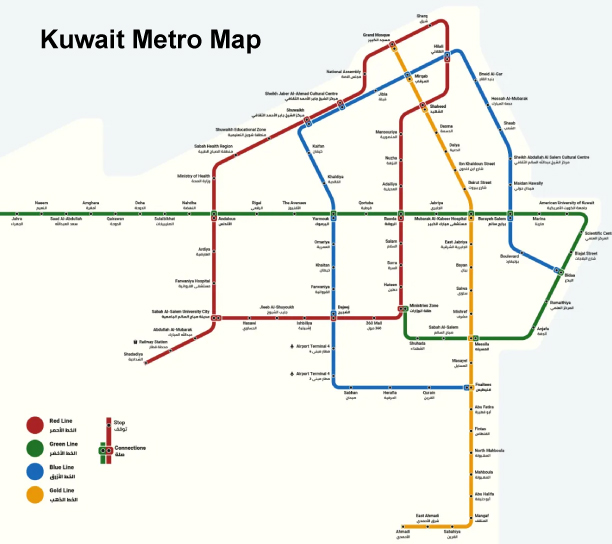Kuwait’s metropolitan area has long faced significant traffic congestion challenges, prompting the government to explore mass transit solutions. While the country does not currently operate a metro system, understanding the history and current status of Kuwait’s metro plans provides valuable insight for residents, visitors, and transportation enthusiasts.
Kuwait Metro Project: The Original Vision
The Kuwait Metropolitan Rapid Transit System Project represented one of the most ambitious infrastructure initiatives in the Gulf region. Originally planned as a four-line metro network covering 160 km with 69 stations, the project was designed to address the increasing congestion on Kuwait’s roads.
Planned Network Specifications
The proposed Kuwait metro system was designed with impressive scope and scale:
Network Coverage: The metro was expected to be serviced by 68 stations after its completion, connecting major areas across Kuwait City and surrounding regions.
Phased Development: The Public Authority for Roads and Transport (PART) of Kuwait disclosed a five-phased construction plan for the metro project in January 2020. The first phase included a 50km line from Kuwait City to Kuwait International Airport, with 27 stations, featuring 30% underground infrastructure with two underground stations and a maintenance depot.
Advanced Infrastructure: The system was planned to incorporate both underground and elevated sections, providing efficient connectivity while minimizing surface-level disruption.
Current Status: Project Cancellation
Unfortunately, Kuwait’s metro dreams faced a significant setback. The project, which had been in the planning stages since the 2000s, was officially cancelled in 2023 due to a lack of funds. The Supreme Committee of the Public-Private Partnership Projects Authority decided to cancel the Kuwait Metro project, which was part of the Rapid Transport Systems Project, due to financial burdens.
Financing Structure
The project was supposed to have been implemented through a public-private partnership (PPP) under the management of the Kuwait Authority for Partnership Projects (KAPP), where the government would have owned 10% of the project and raised 50% of the funds through an initial public offer, with the remaining 40% held by the private developer.
Alternative Transportation Options in Kuwait
While Kuwait lacks a metro system, the country offers several transportation alternatives:
Public Bus System: Kuwait operates a comprehensive bus network connecting major districts and landmarks throughout the metropolitan area.
Taxi Services: Traditional taxis and ride-sharing services provide convenient point-to-point transportation across the city.
Private Vehicles: Most residents rely on personal cars, contributing to the traffic congestion that the metro system was intended to address.
Future Railway Connections: Kuwait remains part of the broader Gulf Cooperation Council (GCC) Railway project, which aims to connect all six Gulf states through a regional rail network.
Regional Context: GCC Railway Project
Despite the cancellation of the domestic metro system, Kuwait continues to participate in regional transportation initiatives. The GCC Railway project represents a significant cross-border infrastructure development that will eventually connect Kuwait with neighboring Gulf countries, facilitating both passenger and freight transportation across the region.
Impact of the Cancellation
The cancellation of Kuwait’s metro project highlights several important considerations:
Traffic Congestion: Without mass transit alternatives, Kuwait continues to face significant traffic challenges, particularly during peak hours and in central business districts.
Environmental Concerns: The absence of efficient public transportation systems contributes to higher carbon emissions and air pollution levels.
Economic Implications: The cancelled project represents a missed opportunity for job creation and economic stimulus that major infrastructure projects typically provide.
Looking Forward: Transportation Planning in Kuwait
While the metro system remains cancelled, Kuwait’s transportation authorities continue to evaluate solutions for urban mobility challenges. Future developments may include:
- Enhanced bus rapid transit systems
- Improved road infrastructure
- Integration with regional railway networks
- Potential revival of metro plans under different financing structures
Conclusion
Although Kuwait does not currently operate a metro system and the ambitious Metropolitan Rapid Transit System Project was cancelled in 2023, the country’s transportation needs remain significant. Residents and visitors must rely on existing alternatives while transportation authorities work to address urban mobility challenges through other means. The cancellation serves as a reminder of the complex financial and logistical challenges involved in developing major infrastructure projects in the region.
For travelers and residents planning transportation in Kuwait, understanding the current absence of metro services is crucial for making informed decisions about getting around the country’s metropolitan areas. While the dream of a comprehensive metro system remains unrealized, Kuwait continues to explore sustainable transportation solutions for its growing urban population.

